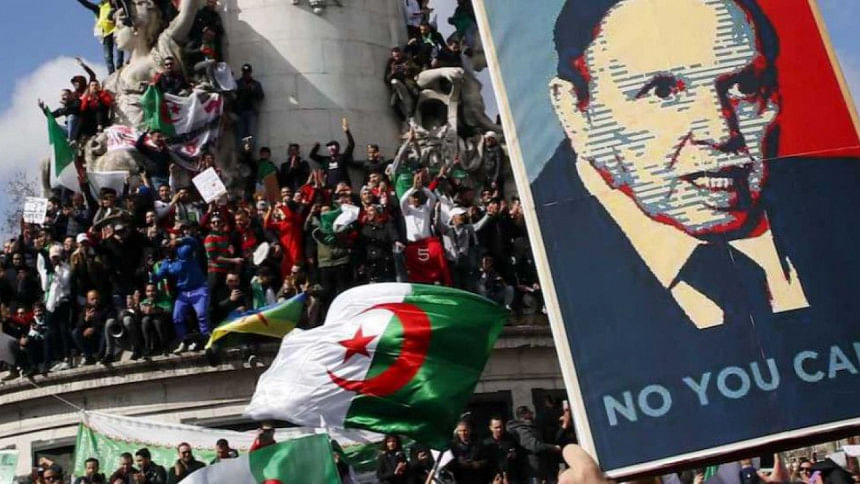Algeria’s moment of truth

To understand what is behind the mass protests in Algeria, it helps to remember that the country's outgoing president, Abdelaziz Bouteflika, held that office for two decades, and served as foreign minister as far back as 1963, the year John F Kennedy was assassinated. The current Army chief of staff is nearly 80, and the current acting president is 77. It is a geriatric regime, presiding over one of the world's youngest populations.
Algeria has not fared well under gerontocracy. In Freedom House's latest report, it is categorised as "Not Free," whereas neighbouring Morocco, Mali, and Niger are all "Partly Free," and Tunisia is now considered "Free." The Algerian regime's mistake was to think that it could re-install Bouteflika, an invalid since suffering a stroke six years ago, for a fifth term without anyone noticing or caring.
Driving today's protests is a deep-seated sense of humiliation among Algerians. Since independence in 1962, its rulers have tended to regard the country's people as their servants, rather than the other way around. But the regime's disdain was especially obvious earlier this year, when its leading figures publicly endorsed Bouteflika's candidacy by bowing down to his picture, because the man himself could neither appear on stage nor speak. This kind of sham may work in North Korea, but in Algeria, people have access to the Internet and international television channels; they can spot a farce when they see it.
Beyond Algeria's lack of pluralism and democracy is its disastrous economic performance. In the World Bank's "Ease of Doing Business" index, it ranks 157th out of 190 countries, whereas neighbouring Morocco ranks 60th. The difference is almost entirely the result of Algeria's archaic rentier-state development model. So obsessed is the government with maintaining an iron grip on the economy that Algeria remains one of the few countries not to have joined the World Trade Organization.
As a result, Algeria has lived almost entirely off oil and gas revenues, which still account for 90 percent of its export earnings. Six decades after independence, the government has yet to make a serious attempt at diversifying the economy. Outside of the hydrocarbons sector, job creation has been an afterthought. Such is the nature of a rentier state, which must maintain a monopoly over the means of production and the creation of wealth in order to control the population.
Until now, the regime has maintained social stability by distributing resources to the population and preventing the emergence of a strong private sector that could challenge it from within. Algeria's lack of democracy and poor economic performance are thus symptoms of the same underlying malady.
The regime's attempt at economic liberalisation in the 1990s turned out to be a false dawn, benefiting only a select few importers and contractors who rely on public tenders. These regime clients are now among the protesters' primary targets. In addition to denying economic opportunities to everyone except the politically connected, the system has bred rampant corruption. On Transparency International's corruption perceptions index, Algeria ranks 105th out of 180, putting it well behind Morocco and Tunisia, which are hardly paragons of good governance.
If the Algerian regime can claim one success, it is in providing schooling to most of the population. And yet the quality of education is deplorable. In the Program for International Student Assessment (PISA) global rankings, the country is near the bottom in every category.
Since independence, the Algerian regime has mixed traditional Arabic patrimonialism with Russian-style oligarchy, such that power rests with a presidential clan, the security services, and loyal clients who live off the rentier state. This arrangement was largely spared from the 2010-2011 Arab Spring, most likely because the trauma of Algeria's civil war, which claimed as many as 200,000 lives between 1991 and 2002, still weighed heavily in people's minds. That remains true, and it may explain why the protests have been overwhelmingly peaceful.
Though Bouteflika is gone, the regime remains in place, hiding behind a constitutional formalism that the protesters clearly do not consider legitimate. Algerians are demanding new political institutions and an orderly transition that prevent the old guard from taking advantage of the interregnum to reclaim power. But they are also being careful not to prevent a backlash from security forces. The pacifist nature of the movement is probably its strongest asset.
Although the regime is planning to hold the previously scheduled presidential election on July 4, continued protests and threats to boycott the election—a considerable number of mayors have said that they will not open polling stations in their municipalities—could force the regime to accept that a political transition is the only viable option. In that case, the election would be cancelled, and a three- or four-member Presidential Council could be put in place to appoint a transitional government and take legal steps in order to organise the transition, with the Army serving as a guarantor. But the precondition is a postponement of the election and the military's endorsement of this scenario.
What is already clear is that a genuine transition cannot be rushed through in just a few months. After more than 60 years of rentier-state autocracy, it will take time for democratic forces to organise and coalesce around common objectives. The goal should be for capable elements of Algerian civil society to take over administration of the state, with the armed forces being neutral. Other than that, all options are on the table. The outgoing regime still warrants suspicion, but the Algerian street now offers ample cause for hope.
Zaki Laïdi is Professor of International Relations and European Affairs at Sciences Po.
Copyright: Project Syndicate, 2019.
www.project-syndicate.org
(Exclusive to The Daily Star)

 For all latest news, follow The Daily Star's Google News channel.
For all latest news, follow The Daily Star's Google News channel. 



Comments